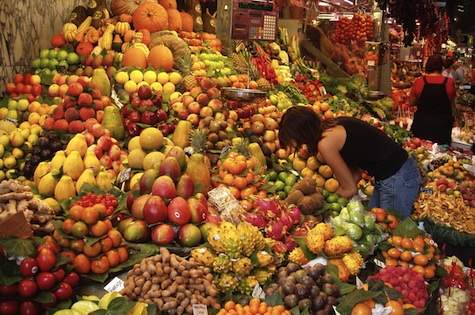Financial Friday: More On Eating Healthy Organics & Affording Them
Financial Friday: More On Eating Healthy Organics & Affording Them
by Alice Shaffer
Regarding Nannies covered National Food Allergy week back in the beginning of May. I am embarking on a more natural and less processed eating lifestyle. There are so many "organics/gluten free" items on the market, but what really is true "organic/gluten free" items. While researching this I found an awesome blog post addressing buying organic foods and eating healthier for less. We all know that eating healthy can cost more than eating processed foods and fast food. It comes from the blog, The Digerati Life. The Digerati Life is a great blog about various finance issues. Make sure to go check it for the other helpful posts on the site.
The organic food market has become huge in the past five years. However, some consumers are still very skeptical about the whole “organic” craze because at times it seems like many foods are getting slapped with the organic label only to be charged at a higher price.
“Organic food” can mean a variety of different things depending on what the item is. For instance, it can mean that there are no preservatives or artificial junk in packaged food. It can also mean that dairy products are processed differently. For vegetables and fruits, it can mean that no pesticides or genetic altering is used.

Image from BuyOrganic.com.au
All of that comes at a premium price and I’m willing to pay it. However, I’ve learned that there are some key ways to save money when buying organic food and I’d like to share some of those tips to help you eat organically and save money at the same time:
How to Buy Organic Food and Eat Well for Less Money
1. Look for options at your regular supermarket first.Whole Foods and other premium supermarkets that are strictly organic are notorious for being about 20% to 30% more expensive than other supermarkets. Many of the other supermarkets stock organic alternatives that may be cheaper than the brands Whole Foods carries. Make sure to check these items out as you may be able to get great deals on organic food.
Even at Whole Foods, there have been a ton of sales lately that make their products a lot more affordable. Make sure to get the coupon booklet when you enter the store. On a side note, Whole Foods also runs some great dinner deals (e.g. in Chicago, every Wednesday they have $8.99 16 inch pizzas including 1 topping made to order).
2. Try your local farmer’s market.
I always check out my local farmer’s market for produce, especially for fruits and vegetables that are in season. This is a great option because you’ll get extremely fresh product at great prices. Not only that but you’ll be helping to stimulate your local economy by buying from local farmers and you get to interact with them too.
3. Grow your own vegetables in your backyard home garden.
You may not want a full-blown home vegetable garden in your backyard but certain spices and vegetables can be grown for relatively cheap and without much daily maintenance. The greatest benefit of growing your own produce is that after the upfront cost of buying the seeds, the rewards are endless as long as you water and take care of the plants. It’s also a fun side project or hobby especially when Springtime rolls around. Learn more about the benefits of a home garden and how you can save money.
4. Join a food co-op.
Joining a food co-op can really help you to save money on meats. Buy in bulk and if you have an extra freezer, freeze the meat and use it for the next month or two. Check out what kind of co-ops are available in your area by a doing a search online. This is a pretty neat concept and works well.
5. Choose to buy only organic foods that are most important to you.
My wife and I frequently shop at Whole Foods but only purchase meats and dairy. These foods are most important to us in terms of being ethically raised, farmed, and processed. If you do ALL of your shopping at an organic supermarket, you’ll spend about double on food unless you shop during the right sales and stay disciplined. In our case, we weren’t all that concerned about getting organic granola or organic tortilla chips. So for foods other than meat and dairy, we shop at Publix, a big discount supermarket chain in the Southeast.
6. Rethink your meals
Finally, try coming up with meals that use fresh ingredients but can be prepared in large batches. That way you can easily reheat and eat again. Also, try cutting out frozen ready made meals and TV dinners like pizzas and other frozen organic foods. These can cost nearly double the price of regular frozen foods, and you wanted to go organic for the health benefits too, right?
My wife and I weren’t perfect when we first started buying organic foods. We started spending about $100 more per month on groceries, and we wrote this off as just the cost of eating better. However, we’ve slowly refined our strategy and started buying at various different vendors which has then allowed us to bring our grocery costs back down to about the same when we were just buying from the local, big supermarket. If you follow some of the tips mentioned in this article and work your own strategy when buying organic, you’ll find that you will start eating better at less cost.
What are your thoughts on going organic? Have you found any effective strategies for spending less while still being able to buy organic?
Erik Folgate is an editor and blogger for the Money Crashers personal finance blog. Visit the site for more guidance and tips on saving money, investing, credit and debt, and more.






0 comments:
Post a Comment